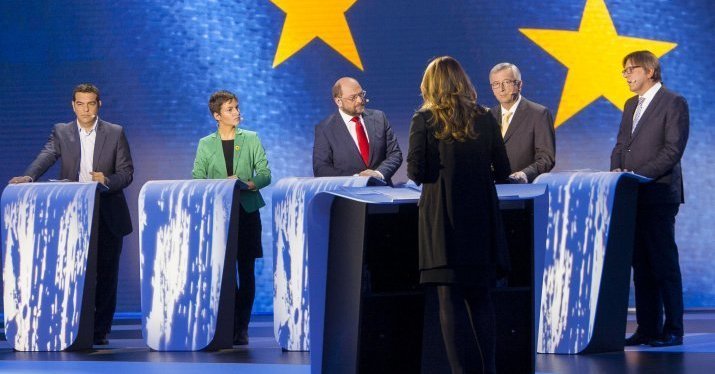It is trendy to talk about the democratic deficit of the European Union. But to solve this deficit, we should take a look at the real difference between European democracy and national democracies. The institutional system is sort of similar, and the EU already has the most important mechanisms of a democracy: the Parliament is elected by direct universal suffrage with proportional representation, and the executive is approved by the Parliament. Apart from the important intergovernmental dimension, how is it really different from national democracies? “Bureaucracy”? Well, regarding our national administrations, let’s put our own houses in order first! Actually, the main difference between European democracy and national democracies lies in debate and information.
The media, main conveyor of democracy
While political parties, candidates and elected representatives are essential to democracy, communication is key. From Antiquity to this day, the media has evolved a lot, but a healthy democracy means citizens who are correctly informed about the political life. Which decisions are taken? Who is responsible? Which issues are raised during the debates? It is of primary importance that answers to these questions easily reach all EU citizens.
As far as European politics are concerned, the national media has always had a hard time fulfilling their role – whereas they fully fulfil it for national politics. This is due to one main prejudice: the citizens would not be interested in Europe. The Young European Federalists (JEF) are used to meeting them and the reality is quite different: the citizens prove to be curious and want to be informed on the European Union. Since they are aware that answers to many of their issues are European, they would like to understand how decisions are made and who is in charge.
Nevertheless, blaming national media would be far too easy. Especially since a lot of editorial boards have lately put a lot of effort to address more European issues. But talking more about Europe is not enough. The problem lies in the national nature of this media: journalists of one nationality communicate to the citizens of the same nationality with a point of view, a framing and an understanding of the issues which is particular to their country. Therefore, information is fragmented, because citizens from each country get a different communication. As these biases are inherent to the national media, it will be impossible to overcome these problems by persisting with this way. A supranational democracy needs a supranational debate, and the national segmentation of information is obviously not making it possible. For this reason, we need to knock these media borders down.
European officials and parties lacking visibility
Today, most Europeans do not even know about European political parties, which is a serious problem in a democracy. Citizens need to know these political movements and their leaders, and they deserve debates confronting their ideas without being stuck in an exclusive national dimension. In European elections, debates usually confront representatives coming from the political families of one countries, often only talking about their country’s influence in Europe, which does not bring anything to the construction of a political Europe.
Democracy also means that elected representatives are accountable to the citizens. Even if they are not well-known by everyone, our national ministers and influential MPs often speak on television, the radio, in the newspapers, and are required to present and explain their projects and their political choices. They are accountable to their electorate. The same thing is necessary for European representatives. The citizens need to be able to clearly identify who is in charge of the decisions, so that they can influence political choices.
Which solutions?
There is no need to create a new media, which would probably not have the expected impact. The easiest and most efficient way would be that big national media, especially television or radio channels, broadcast European-related programmes during peak viewing times. It could be news, debates or decoding programmes, produced and realised through the collaboration of several national media. It would not be a first, such collaborations already exist: in 2014, the European Broadcasting Union, an alliance of multiple national media, enabled the organisation and broadcasting of the debate between the candidates for President of the European Commission (the Spitzenkandidaten). We now have to go further. Big media, whether public or private, has to forge partnerships or develop the existing ones, in order to create and broadcast this European content.
Even without a pan-European district, the broadcasting of several debates confronting the ideas of the different European political movements would be relevant, in order to Europeanise the 2019 elections. We should then keep on this dynamic, to live European democracy outside electoral periods only. In the long run, we should end in the establishment of European editions of TV news, which would precede the national editions. The potential translation costs would be easily compensated by savings allowed by the mutualisation of production costs.
Why television?
In the Internet era, you may wonder why betting on TV programmes, when citizens today get information from other sources? Radio and television are still playing a central role in the national political life. Internet and social networks are generally only used for relaying or commenting content or information coming from traditional media. We are witnessing a “delinearization”: the average time spent in front of TV screens is decreasing. However, time spent watching TV programmes on all sorts of screens is still slightly increasing. Television also has the advantage of being universal, by communicating the same information to everyone, whereas social networks contribute to fragmentation. If Europe is too far from the citizens, let’s bring it directly inside our living rooms!





Follow the comments: |
|
